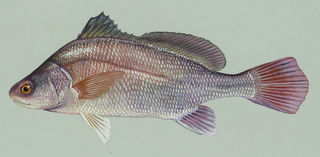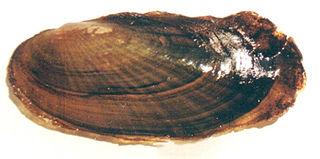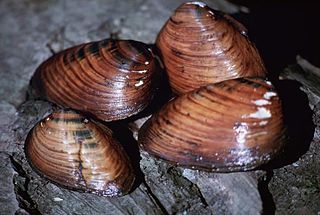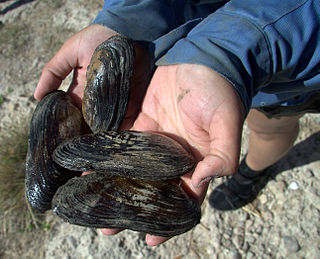
The Great Lakes, also called the Great Lakes of North America, are a series of large interconnected freshwater lakes in the east-central interior of North America that connect to the Atlantic Ocean via the Saint Lawrence River. The five lakes are Superior, Michigan, Huron, Erie, and Ontario, and they are in general on or near the Canada–United States border. Hydrologically, Michigan and Huron are a single body of water joined at the Straits of Mackinac. The Great Lakes Waterway enables modern travel and shipping by water among the lakes.

The Tippecanoe River is a gentle, 182-mile-long (293 km) river in the Central Corn Belt Plains ecoregion in northern Indiana. It flows from Crooked Lake in Noble County to the Wabash River near what is now Battle Ground, about 12 miles (19 km) northeast of Lafayette. The name "Tippecanoe" was derived from a Miami-Illinois word for buffalo fish, reconstructed as */kiteepihkwana/ or as kiteepihkwana siipiiwi.

The zebra mussel is a small freshwater mussel. The species originates from the lakes of southern Russia and Ukraine, but has been accidentally introduced to numerous other areas and has become an invasive species in many countries worldwide. Since the 1980s, the species has invaded the Great Lakes, Hudson River, Lake Travis, Finger Lakes, Lake Bonaparte, and Lake Simcoe. The adverse effects of dreissenid mussels on freshwater systems have led to their ranking as one of the world's most invasive aquatic species.

The quagga mussel is a species of freshwater mussel, an aquatic bivalve mollusk in the family Dreissenidae. It has an average lifespan of 3 to 5 years.

The freshwater drum, Aplodinotus grunniens, is a fish endemic to North and Central America. It is the only species in the genus Aplodinotus, and is a member of the family Sciaenidae. It is the only North American member of the group that inhabits freshwater for its entire life. Its generic name, Aplodinotus, comes from Greek meaning "single back", and the specific epithet, grunniens, comes from a Latin word meaning "grunting". It is given to it because of the grunting noise that mature males make. This noise comes from a special set of muscles within the body cavity that vibrate against the swim bladder. The purpose of the grunting is unknown, but due to it being present in only mature males and during the spawning season, it is assumed to be linked to spawning.

The Unionidae are a family of freshwater mussels, the largest in the order Unionida, the bivalve molluscs sometimes known as river mussels, or simply as unionids.
Alasmidonta atropurpurea, common name Cumberland elktoe, is a species of freshwater mussel, an aquatic bivalve mollusk in the family Unionidae, the river mussels.

Sinanodonta woodiana, the Chinese pond mussel, Eastern Asiatic freshwater clam or swan-mussel, is a species of freshwater mussel, an aquatic bivalve mollusk, in the family Unionidae.

Unionida is a monophyletic order of freshwater mussels, aquatic bivalve molluscs. The order includes most of the larger freshwater mussels, including the freshwater pearl mussels. The most common families are the Unionidae and the Margaritiferidae. All have in common a larval stage that is temporarily parasitic on fish, nacreous shells, high in organic matter, that may crack upon drying out, and siphons too short to permit the animal to live deeply buried in sediment.

Anodontoides is a genus of freshwater mussels, an aquatic bivalve mollusk in the family Unionidae, the river mussels.

The birdwing pearlymussel is a rare species of freshwater mussel in the family Unionidae, the river mussels. This aquatic bivalve is native to Tennessee and Virginia in the United States. Its range has declined over 90%. It is a federally listed endangered species of the United States.

Potamilus leptodon, the scaleshell mussel or scale shell, is a species of freshwater mussel in the family Unionidae, the river mussels. This aquatic bivalve mollusk has disappeared from much of its historical range. It is endemic to the United States, where it is now present in four or fewer states; it is only found with any regularity in Missouri. It is a federally listed endangered species of the United States.

Atlanticoncha ochracea, the tidewater mucket, is a species of freshwater mussel, an aquatic bivalve mollusc in the family Unionidae, the river mussels. Formerly classified in the now-defunct genus Leptodea, it is now considered the only member of the monotypic genus Atlanticoncha.

Pleurobema clava, the clubshell, club naiad or clubshell pearly mussel, is a species of freshwater mussel, an aquatic bivalve mollusk in the family Unionidae, the river mussels.

Popenaias popeii, common name the Texas hornshell, is a species of freshwater mussel, an aquatic bivalve mollusk in the family Unionidae, the river mussels.

Epioblasma triquetra, common name the snuffbox mussel, is a species of freshwater mussel, a mollusk in the family Unionidae. It is native to eastern North America, where it is a listed as an endangered species in both Canada and the United States.

Truncilla truncata, the deertoe, is a species of freshwater mussel, an aquatic bivalve mollusk in the family Unionidae.

Freshwater molluscs are those members of the phylum Mollusca which live in freshwater habitats, both lotic such as rivers, streams, canals, springs, and cave streams and lentic such as lakes, ponds, and ditches.

Potamilus ohiensis, the pink papershell, is a species of freshwater mussel, an aquatic bivalve mollusk in the family Unionidae. It is also known as the papershell or fragile heelsplitter, and is similar to the Leptodea fragilis and Potamilus alatus species.

Pyganodon cataracta, formerly Anodonta cataracta, is a species of large freshwater mussel, an aquatic bivalve mollusc in the family Unionidae, the river mussels. Its common name is the eastern floater.





















